#writing character analysis
Explore tagged Tumblr posts
Text
There’s one part in Red Dragon that I can’t stop thinking about.
Right at the start of chapter 8, right after the chapter where Will speaks to Lecter.
“Dr. Hannibal Lecter lay on his cot with the cell lights down after Graham left him. Several hours passed.
For a while he had textures; the weave of the pillowcase against his hands clasped behind his head, the smooth membrane that lined his cheek.
Then he had odors and let his mind play over them. Some were real, some were not. They had put Clorox in the drains; semen. They were serving chili down the hall; sweat-stiffened khaki. Graham would not give him his home telephone number; the bitter green smell of cut cocklebur and teaweed.”
It’s like this:
First and foremost, it’s been several hours since Will left. Will wasn’t there very long in the first place, maybe two hours if we push it, and for one of those hours he left Lecter alone.
Second, the first thing Lecter says to Will is this: “That’s the same atrocious aftershave you wore in court.”
Third, “Some were real, some were not.” The first part of the sentences following are real, the second parts are not. That’s the implication. Lecter is described only a chapter before as neat. He sorted the real and fake into two columns. What does that leave us with?
What’s real: Clorox in the drains, chili down the hall, Will Graham would not give him his home telephone number. We know these are the real scents because Will didn’t give him his home telephone number, a true statement, and it matches the columns.
(I’ve long wondered what Will not giving his home telephone number smells like.)
What’s not real: semen, sweat-stiffened khaki, cut cocklebur and teaweed.
What’s my point? Why do I bring attention to these details?
I believe the scents Lecter imagines are in reference to Will.
“Sweat-stiffened khaki.” We don’t know what Will is wearing (it would have been incredibly strange for Harris to describe what Will’s wearing, he almost never describes what anyone wears unless it’s important), but we can assume Will was sweating. From chapter 7, “He had to go to the rest room twice. He was numb.” Will is nervous throughout the encounter. Will is also, I have to tell you, the type of man to wear khaki.
“Cut cocklebur and teaweed.” I believe this is the scent of Will’s aftershave. Why do I think that? Lecter describes it as “the bitter green smell,” implying distaste. Further implying this, after he thinks of this particular scent, he sits up. He doesn’t like it. It bothers him enough to comment on it.
Also, I just can’t imagine why else he would smell cocklebur and teaweed, it’s really out of place if it doesn’t have to do with Will’s aftershave. I suppose it could just be a scent that he doesn’t like, but he pairs it directly with his main source of irritation, ie: Will would not give him his home telephone number. This implies a direct connection between the two, because both irritate him. The bitter smell and Will’s refusal.
Now, my main focus. “Semen.” When I originally read this passage, my assumption was that Lecter is making an educated guess as to why they would put Clorox in the drains. I’m not sure that’s the case. Lecter is the type of man who could smell semen underneath the Clorox, but the smell of semen is firmly in the “not real” category.
I’m just going to cut to the chase. I think Lecter is thinking about the scent of Will’s semen.
Why do I think this? Well, a few reasons. I don’t know if I believe Will actually smelled like semen upon visiting Lecter in prison. That would be a little bit… out of place? He hasn’t had sex in a while and he hasn’t masturbated. We know this. Don’t ask why, but we know this. It wouldn’t really make sense for Will to smell like semen. I mean, I could worm out an explanation for a possibility of how he could smell like semen, draft one of this text, but I won’t.
The semen smell doesn’t actually have to have been present. Just as Will’s aftershave and sweat are no longer present while Lecter is imagining them, the semen could be fabricated entirely.
I suppose my point is this. Why does Lecter imagine the smell of Will’s semen? Does it bother him? Perhaps all of these scents, real and fake, are bothersome to him, Clorox and chili included. It could irritate him. And he’s upset at Will in the first place, so it could very well be another straw on the camel’s proverbial back.
I don’t know if Will’s sweat bothers Lecter. Making Will nervous makes Lecter experience joy. He knows Will doesn’t like him, and he still sent Will a Christmas card. He likes luring people into a false sense of security and then ripping the rug out from under them. I don’t know if the scent of Will’s nerves would bother Lecter.
Okay, does he like the smell of semen then? Also debatable. I mean, he could, I suppose. Lecter is a man who eats human flesh. He’s not exactly the prime example of a person with “normal” taste. He could very well enjoy the scent, I would have no way of knowing either way.
Maybe it’s neutral. This three example case could be like this: neutral, like, dislike. Neutral to Clorox and semen. He likes sweat and chili. He dislikes Will not giving him his home telephone number and Will’s aftershave. That could be it. We know he enjoys food, even at this point, so he could very well enjoy the scent of chili. Somehow, I doubt prison chili smells as good as maybe other types, but I digress.
Why am I bringing any of this up? Good question.
I suppose, I’m just curious. Was the intention for Lecter’s obsession to be sexual? Or maybe not sexual, but romantic wouldn’t be quite the right word either. This book came out in 1981. A lot of early media depicting gay people did so exclusively by hinting at their sexuality with stereotyping. I’ve never seen someone (aside from Bryan Fuller I guess) who talked about this possible aspect of Lecter.
Lecter is described as small, lithe. He’s vain and prideful. You could say our first real introduction to Lecter is through Chilton, who states outright that Lecter knows a lot about Will. His first comment is on Will’s smell. He speaks with his head always tilted. (That one’s not stereotypically gay, I just think it’s kind of funny because whenever I write for him, I tilt my head without thinking about it) His final letter to Will ends with: “I think of you often.” He is, and I cannot stress this enough, highly invested in Will’s looks.
I just feel like, when you take into context that this was a period of time when being gay was highly frowned upon, queerness is mentioned several times throughout the book, Lecter calls him “my dear Will,” and while a cannibalistic serial killer being obsessed with you is a scary thought, wouldn’t, in the 80s, a gay cannibalistic serial killer being obsessed with you be scarier?
I know that Lecter’s characterization does change later on, in Silence of the Lambs and so forth. I’m not talking about those. Red Dragon was his first appearance. Mind you, he still rambles. But still.
I just wonder is all. A lot of people focus so much on his appearance in Silence of the Lambs, especially the movie version, but I ponder the early days, you know?
#the inane ramblings of a madman#hannibal#red dragon#hannibal lecter#will graham#hannigram#i think#i ponder hannibal often#to be quite frank#i think perhaps harris didn’t foresee lecter’s popularity#i don’t know though#here’s to me#writing character analysis#on a version of the characters that no one cares about#👍#long post#very long post#lot of talk of semen in this one boys#don’t know how i feel about that#but oh well
14 notes
·
View notes
Text
List of 40 character flaws
Stubbornness, Unyielding in one's own views, even when wrong.
Impatience, Difficulty waiting for long-term results.
Self-doubt, Constant uncertainty despite evident abilities.
Quick temper, Excessive reactions to provocations.
Selfishness, Prioritizing one's own needs over others'.
Arrogance, Overestimating one's own abilities.
Trust issues, Difficulty trusting others.
Perfectionism, Setting unreachable high standards.
Fear of change, Avoiding changes.
Haunted by the past, Old mistakes or traumas influencing the present.
Jealousy, Envious of others' successes.
Laziness, Hesitant to exert effort.
Vindictiveness, Strong desire for revenge.
Prejudice, Unfair biases against others.
Shyness, Excessive timidity.
Indecisiveness, Difficulty making decisions.
Vulnerability, Overly sensitive to criticism.
Greed, Strong desire for more (money, power, etc.).
Dishonesty, Tendency to distort the truth.
Recklessness, Ignoring the consequences of one's actions.
Cynicism, Negative attitude and distrust.
Cowardice, Lack of courage in critical moments.
Hotheadedness, Quick, often thoughtless reactions.
Contentiousness, Tendency to provoke conflicts.
Forgetfulness, Difficulty remembering important details.
Kleptomania, Compulsion to steal things.
Hypochondria, Excessive concern about one's health.
Pessimism, Expecting the worst in every situation.
Narcissism, Excessive self-love.
Control freak, Inability to let go or trust others.
Tactlessness, Inability to address sensitive topics sensitively.
Hopelessness, Feeling that nothing will get better.
Dogmatism, Rigidity in one's own beliefs.
Unreliability, Inability to keep promises.
Closed-offness, Difficulty expressing emotions.
Impulsiveness, Acting without thinking.
Wounded pride, Overly sensitive to criticism of oneself.
Isolation, Tendency to withdraw from others.
#writing#writer on tumblr#writerscommunity#writing tips#character development#writing advice#oc character#writing help#creative writing#character flaws#flaws#character analysis
11K notes
·
View notes
Text
one thing that i find interesting is that even though we never get to interact with Marika directly, only knowing her via obscure cutscenes and other characters' dialogue... she actually displays a wide range of emotions as much as any other NPCs.
her statues depict her as having a warm, gentle smile:
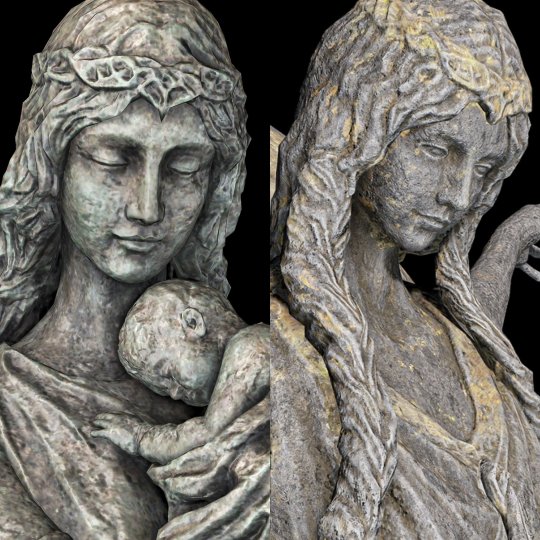
the Mimic veil description points to her playful, mischievous side:
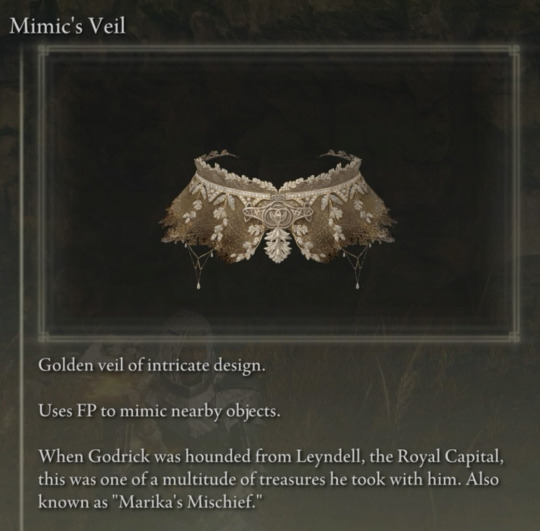
(it's a popular theory in the JP/Asian side of the fandom that it's sth from her childhood - hence the "Marika's Mischief", not "Queen Marika's", and she used it to escape the grisly fate befalling her family.
additionally, its equivalence in Dark Souls is also something described as "the mischief of a young girl who sought relief from the solitude of the woods at dusk", aka Princess Dusk who hails from "Oolacile, land of ancient golden sorceries", but i digress)
her portrait, the story trailer's "Queen Marika was driven to the brink" and Gideon's dialogue after the player defeated Malenia pointed out her sorrow:

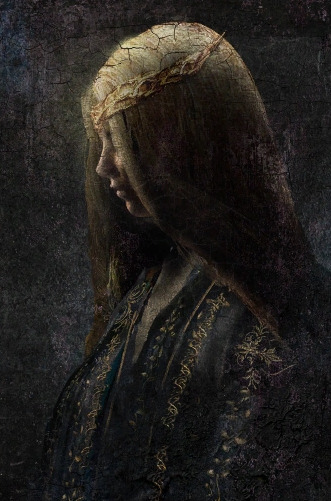
(back when i first played the base game, this is the portrait that drove my eyes most in Roundtable Hold. i kept gazing at her - the Queen with permanently lowered eyes, and thought "there is a girl in there")
The bat lady's song, Messmer's entire Crusade, all those conflicts to establish the Erdtree, shows her anger, and the cruelty she's capable of:

Then there's Shaman's village, the clinic underneath Shadow Keep, the golden braid, the Minor Erdtree, the sealing of Death - that points to grief, trauma, survivor guilt, kindness, and the ruinous drive for revenge that results in the above path down hell:

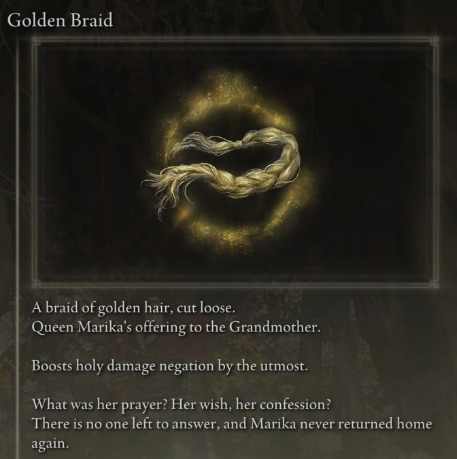
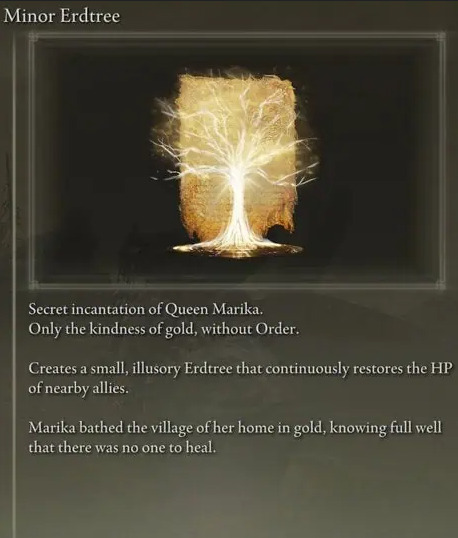
(there's also a theory for the Crusade's headless statue being a reminder for the Hornsent of what they put Marika's mother through, but it's not concrete canon so here is the link if you want to check it out)
The fact that all of Erdtree's incantations are heal and protection spells (with only one exception of Wrath of Gold spell which was found after the Elden Ring was shattered), the Capitol's Perfumers originally being blessed healers, and that all Erdtree blessings come in the shape of tears give the picture of Marika's gentle wish at the beginning: to heal everything and everyone.
(and to me personally, there's a kind of vulnerability and honesty in showing your tears to the world and let it be your power to heal at the same time.)
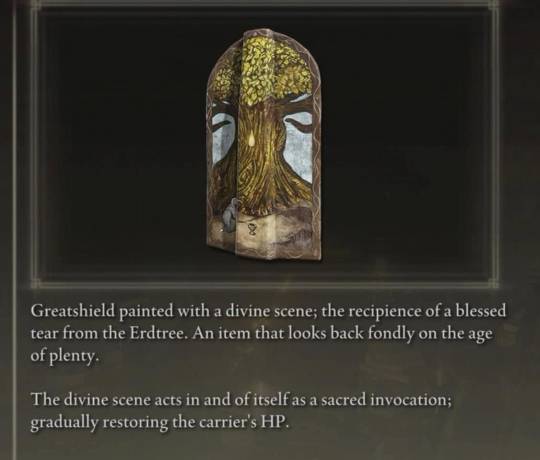

the eye she blessed Messmer with (i do think the Eng translation at some part lost the sentiment of the JP text - that the eye is always referred to as a blessing)
the blessing flask that - unlike its Dark Souls equivalent (which ranges from 6-13 flasks), only have 4 available to us player, heal all ailments and status effect, and specified as sth made for Messmer.
the Marika's soreseal in the Haligtree + the waterfall near Godwyn's final resting place
the Regal Omen Bairn (that was fashioned after the Jizo statue - sth made by grieving parents wishing for protection for their deceased child in the afterlife)
the blessing, gifts, equipment that Messmer and Godwyn's personal knights all get
the fact that Marika's bedchamber and the Impaler's Catacomb (which is the only catacomb in the base game to have the spike trap mechanic used in catacombs in the DLC) remain the proof of Messmer's existence in the base game
how Godwyn's ending is the only ending where the mending rune is placed on the position of Marika's womb (the lower arc or the Elden Ring - also referred to as the basin in which its blessings pool)
that's a whole barrage of motherhood. the love, the fear, the postpartum depression, the guilt and anxiety, (the occasional scheming for revenge with her son). and despite how flawed and tragic that love ends up being for all of them, it is there.
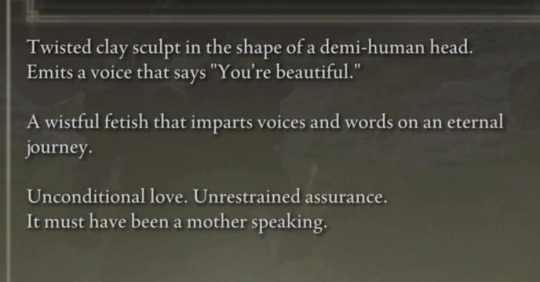
(there's a whole subplot about how Messmer is the only demigod to be called ugly in-game (Hornsent npc dialogue) while Boc's questline is about how his mother being the only one to always assure him he's beautiful, despite everyone else calling him ugly. and how each NPCs questline does reflect a wider theme seen in Marika and her children. but again, i digress)
every time i think of her, Marika is a constantly shifting kaleidoscope, holding everything from within (the beauty and the malign, light and dark, birth and death, she's warm and gentle, she's cruel and unjust, she's strong and kind, she's weak and resentful, she's sweet and she's bitterness made flesh)... and i could only stand there and admire it all.
#elden ring#queen marika the eternal#my uwu baby with a disorder#every time i do the ending the only thing in my head is “to you who bloomed and fell away as a fruitless flower. farewell”#she got me writing essays like the average fandom male character analysis :)#messmer the impaler#er brainrot#golden doomed mother and son#ending this year with another marika rant like god intended
833 notes
·
View notes
Text
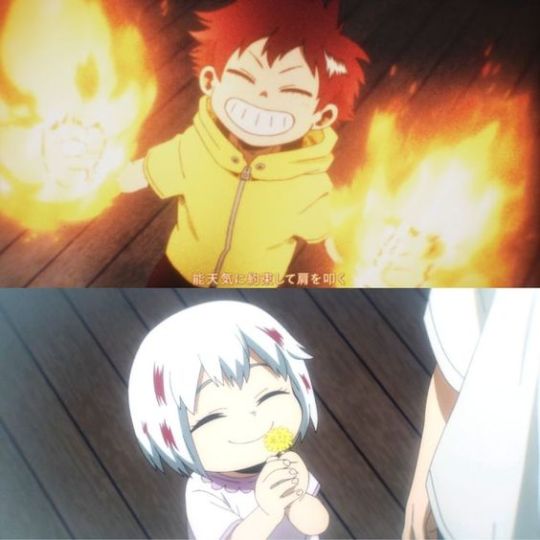
Based on the way Touya and Fuyumi behaved in their very early years, I've always gotten the impression the Todoroki family started out with something of a healthy dynamic.
The reason they were born was pretty twisted and Endeavor's ambitions may have made the foundation rotten, but I think they were 'fine' until the genetic disparity with Touya's Quirk was detected. What's sad about that is if Touya didn't have that issue, he and Fuyumi would probably have been the only two siblings. Endeavor wanted Touya for a successor. Rei wanted Fuyumi so that Touya would have a sibling and they could support each other.
Natsuo and Shouto were born because Endeavor's ambitions meant more to him than his family.
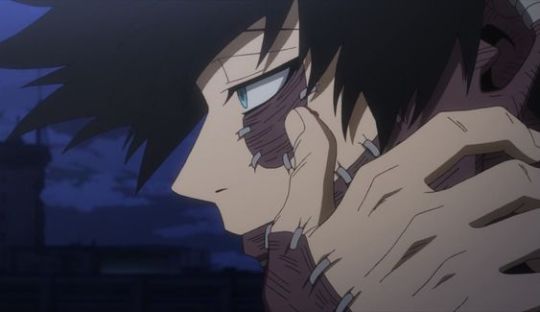
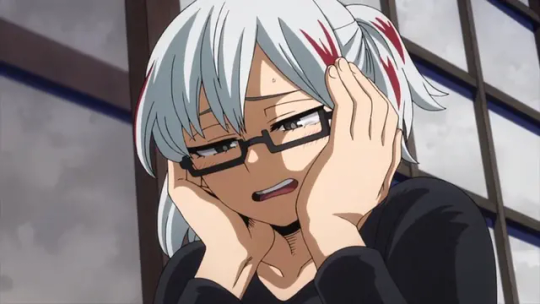
And tragically, Touya and Fuyumi are the only two kids in that family who can remember this happy life. It's why Fuyumi was so desperate to get it back, and in his own warped way, Touya also tried to reclaim it.
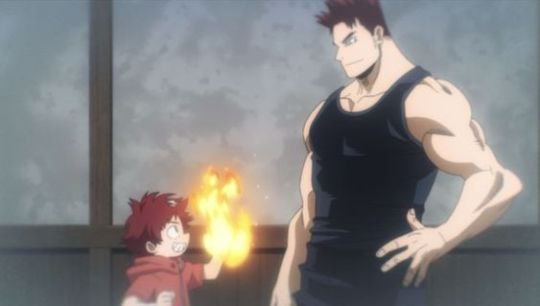
Here's the thing that gets me, though:
It is very common and normal for a toddler to prefer one parent over the other. Usually, it's the parent they're the most family with: The one that stays home with and takes care of them.
Remember, to a toddler, everything is new and potentially scary, and that can often include a parent that is not always present: The parent that's working.
In the Todoroki house, Endeavor had his career as a hero, so we have the indication that Rei was the parent who stayed home. In that situation, the probability of Rei being the 'familiar parent' was more likely, so for Touya to prefer his father over his mother shows just how close he was to Endeavor. That probably happened because 1.) we can see Endeavor started training him at a very young age, and 2.) Fuyumi was the new baby and probably needed more attention from their mother, so Touya may have gravitated away from Rei on his own and went to his father instead.
Touya didn't see his father's ambitions for him. He didn't see that he was a successor as opposed to a son. What he, a child, saw and understood was that his father loved him and wanted to spend time with him. After the genetic disparity was detected and that pride and affection disappeared, he didn't know how to cope.
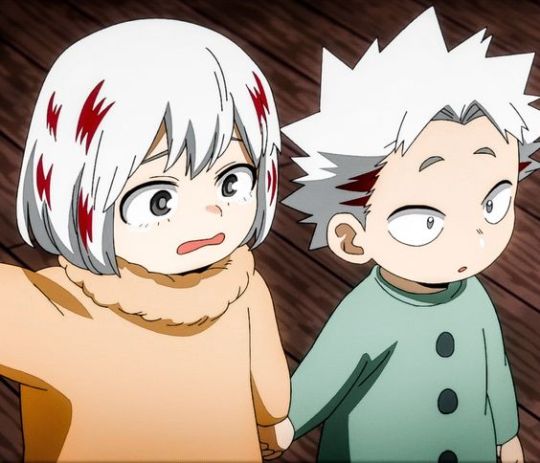
In contrast, Natsuo and Shouto never even saw the family happy. Natsuo was three-four years old when this happened. Fuyumi looks devastated that things aren't her version of normal. Natsuo just looks confused because, again, everything is new to toddlers. This was the normal he grew up with. Touya attacking Shouto might be one of his first memories, so he never stood a chance and that is why he left home the moment he had the opportunity.
It also explains his lack of understanding for Fuyumi's hope for a normal family. Fuyumi's mindset runs as, "We had that once. It's possible to have it again." Which in its own way, expecting things can just return to the way they were is a little disrespectful to her brother that died, and I think Touya's reappearance did shatter her illusion since she never brings up 'being a real family' after Dabi's Dance.
The point is, since Natsuo never saw what Fuyumi and Touya saw, he can't see what she wants to return to, so her decision to forgive their father is one he can't comprehend.
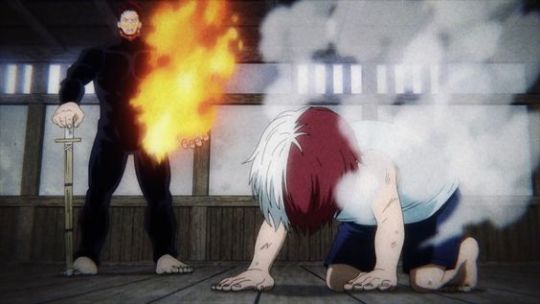
And if Natsuo can't remember the happy family, then there's no way Shouto does because this is what their home looked like by the time he was old enough to start forming concrete memories.
We're looking at two different sets of children, the older pair and the younger pair, who started out with very different childhoods.
#my hero academia#fuyumi todoroki#touya todoroki#dabi#todoroki family#natsuo todoroki#shouto todoroki#rei todoroki#endeavor#enji todoroki#boku no hero academia#bnha#mha#character analysis#this started off as short blip#wasn't expecting to write a brief analysis tonight
2K notes
·
View notes
Text
as much as I love the common "Tim worships/stalks Jason" trope in TimJay fanfiction because it's Good and making Tim a weird little freak is Fun, I think the underutilized dynamic is where Jason is the one weirdly obsessed with Tim and makes it Tim's problem.
Like, the moment Jason is confronted with the information that a third Robin exists, the first thing he does is cover his wall with pictures of Tim so he can just obsess and torture himself over it. That is the behavior of a man who is Unwell over Tim's existence and I love it.

red hood: lost days #4
And as much as a shitshow as The Titans Tower Incident™ is characterization-wise (though I think it has far more merit in depicting Jason's character than people give it credit for but I digress-) there's something very fun about the fact that even after kicking his ass, Jason respects Tim and is impressed by him.

teen titans (2003) #29
And on top of that, Jason can't seem to stop trying to ask Jason to Tim to work with him in some capacity.


robin (1993) #177



batman: battle for the cowl #2
While Battle for the Cowl is an exceptionally bad comic, especially for its characterization of Jason and the "be my Robin" bit is taken deeply out of context, I do think it's interesting how obsessed Jason is with believing that Tim is extremely competent, only held back by being "brainwashed by Bruce". (hence him leaving Tim for dead later on in the comic.) Jason seeing a darker side of Tim and wanting to bring that out of Tim, wanting to see what Tim could be if he let go of his loyalty to Bruce is so fun to me, tbh.
And in Robin #177, Jason seems genuinely upset Tim doesn't want to work with him. Jason sees such a raw potential in Tim and is obsessed with it, constantly wanting Tim to work for him and see Tim be the type of person Jason is. And despite Tim rejecting him, Jason doesn't shoot to kill Tim. I just cannot get over the fanfic potential of Jason obsessing over Tim, tracking him and seeing what he's capable of and what he could be capable of. Wanting to make Tim see things the way he does. To Tim it's corruption, to Jason it's freedom. Tim trying to 'save' Jason is fun and all, but Jason trying to corrupt Tim? That's even more fun to me. Watching that power struggle between them, Tim unable to get Jason off his heels as Jason gets more and more possessive and bold with each attempt.
And when Jason sees Tim successfully get Gotham back under control after a gang war, he's impressed. He praises Tim, even. And then Tim just. Breaks him out of prison.

robin (1993) #182
The way they're constantly trying to see something in the other that isn't there, hoping the other will come around? That is the most fucked up hate/love dynamic ever. Jason keeps coming back to Tim, keeps trying to find ways to get Tim onto his side. They're always chasing each other. And I think Jason would be the one to confess love first, the one to do anything to make Tim his. And when you consider after all of this, Tim has his Red Robin arc and is at his lowest, getting the closest he ever gets to considering murder? I think it'd be so fun to see Jason take advantage of that and worm his way back into Tim's life and finally push Tim over the edge.
#jaytim#timjay#tim drake x jason todd#jason todd x tim drake#batcest#necrotic festerings#for the record i could've continued showing examples if i delved into the new-52#but this is meant to be entirely a pre-flashpoint meta analysis of their dynamic#but in the new-52 jason explicitly says tim is the only member of the batfam he likes and they work together regularly#but new-52 also ate ass with tim's characterization so i cannot use it in good faith on this post.#my first tumblr meta on this blog and i'm feeling stressed about putting my thoughts in the open won't lie#one day i'll come back to the titans tower incident and expand on my thoughts on why it's not as bad as ppl make it out to be#dare i say. it's mostly in character for jason minus the ridiculous robin suit and some of his grandstanding#but that debate is for another day#fyi anyone can take this stuff as a prompt/inspo and run with it for fic pls go wild#someday i'll probably write my own take on it too
2K notes
·
View notes
Text
It's actually funny, in a meta way, how people are salty about Miquella being a villain. Because, like, that's how it is in-game too.
The people of the Lands Between wanted Miquella to be the solution to their problems. To be the promised savior. The God who would get it all right and do what Marika tried to do and failed so resoundingly, bring an age of infinite prosperity.
But, no, it doesn't work like that. Gods can't solve their problems. The Gods want their own ends and then convince people that what they want is what's best for them. The fans are the same as the poor bastards in the Haligtree, waiting for their savior, only for it to turn out he's just another spoiled kid.
It's brilliant, from a writing perspective. They kept Miquella vague, letting the Soulsborne fandom do what it always does, theorize, investigate, and build up ideas. We built up an image of Miquella as a savior, a hero, one of the only truly heroic characters to understand and get it right.
But in the end, Miquella fooled us as well as he fooled his own people.
#Elden Ring#Shadow of the Erdtree#Spoilers#Shadow of the Erdtree Spoilers#Soulsborne#Shadow Soulsborne Ring#Miquella#character analysis#character meta#writing analysis#writing meta#critical analysis#Miquella the Kind#Miquella the Unalloyed
1K notes
·
View notes
Text
Big Mama's Dialogue
I've heard a few people lament on how Big Mama is difficult to write because of how she speaks, so I thought I'd share my tips and tricks.

I start out by writing what I intend for her to say without the flowery language added on. For example:
"I look nice in the new jacket I bought."
Doesn't sound like Big Mama at all, but it'll help you have a place to start so you don't have to be intimidated by scrolling through thesaurus.
Now, Big M has a tendency to do the following:
Use outdated American slang (anywhere from the 1920's to the 60's)
Apply alliterations (using the same letter at the beginning of a word to the adjacent/close word)
Use adverbs, so describing words with the end suffix -ly (i.e. softly, mysteriously, quickly)
Sprinkle in a few made-up words
So let's take the base sentence I provided an shape it to Big M's standards.

Resources for American slang:
Instead of word vomiting out all the outdated American slang I know, I'm going to link some resources/websites you all can look at and come back to. She mostly uses 20's slang, so the links are centered around that.
1920's slang PDF, alphabetically organized!!!
List of slang phrases originating from the 1920's to the 2010's
Short list of slang flapper's from the 1920's used
So let's edit our base sentence a little, now it's:
"This new jacket I bought is the cat's meow."

Adding the next layer:
I did mention that Big Mama tended to use both alliterations and adverbs in copious amounts, but don't feel pressured to use both at once in a sentence. If it fits, it fits. If it doesn't, some trimming might be useful. This is why having a base sentence is important, so the intention behind the dialogue isn't lost under all the additions you're adding. So with that in mind, I'm going to alter our example:
"This new jazzy jacket I just bought is the cat's meow."
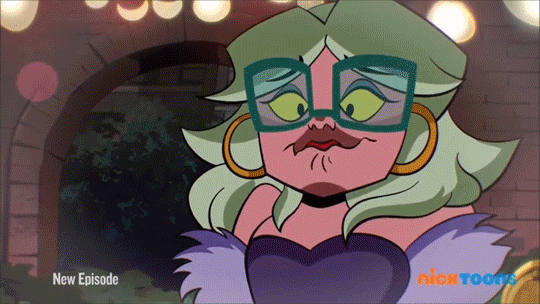
The last part:
I save the "fake words" part for last, because beginning with them can make your sentences clunky or not make sense. This part really relies on your personal touch or the context and tone of the situation at hand. The example I gave make Big Mama sound like she's preening about her looks, so I'm going to lean into that.
"This newsie-woozie jazzy jackety I just bought is the cat's meow! Grr!"
And for comparison, here's where we started.
"I look nice in the new jacket I bought."
And well, that's it!!! Hope it was helpful to those that needed it!!!
#rottmnt#rise of the teenage mutant ninja turtles#rise of the tmnt#rottmnt big mama#fanfic#character analysis#writing tips#tmnt#teenage mutant ninja turtles#critter talks#big mama
4K notes
·
View notes
Text
Joel winning the Life Series where he centered his entire gimmick this season around Family under the guise of "Joel Toretto" makes me insane because he was alone for so long in the Life Series and it works out so perfectly that the guy who was allergic to allies for the start of the life series and had to be forced into it with soulmates wins the season he focuses on Family. Poetic cinema.
1. Third Life Joel. No friends. No allies. He joined up with Monopoly Mountain last minute and died out of sight of either of them, mostly alone. He had a house full of dogs, not full of friends (and where is that familiar?), and nobody really mourned him when he was gone, offhand comments and brief "Oh No!s" following his death. Being alone got him nothing.
2. Last Life Joel. No friends. He's alone again, for the most part. In Last Life there's a lot of unknowns, a lot of instability- people can get back in yellow or green, or they try, so Joel has temporary red alliances with the likes of Scar and Grian but they don't last. He's alone. Again. Joel laments it, in one of his videos, IIRC, that he's bad at making allies, and "look at where it got him". The closest person he had to an ally in Last Life was Grian when they were both red, Grian seeing first hand how insane and blood thirsty Joel becomes on red. They call themselves the Deadliest Duo, and they kill people, and they laugh when they die. But Joel dies, still, killed by Scott, shortly after Grian permadies.
3. Double Life. Now it's different. Now we're seeing some changes. Joel gets put with Etho, who off the bat immediately considers him a liability, a notion he rejects and fights against to get Etho to respect him. He builds Etho a ship to try and impress him. Etho purposefully takes fall damage to remind him of what's at stake. He's not just a lone wolf, anymore, Etho's life is in his hands and he's not happy about it. Joel hates it, being treated fragile and like a bomb to go off. Eventually, they find out they work together well, they get killed, they go red and Joel goes crazy. Red rage is a real, definable, re-occuring phenomenon for Joel, he IS angry and he DOES want to make people pay. Etho in the life series is usually more reserved, and he holds Joel back, yes, but Joel also helps Etho out of his shell and pushes him to do things he wouldn't normally do. The ship burns everything burns. And then they burned. And Joel's first real alliance goes up in flames, literally.
4. Now Joel has a taste of what it's like to not be alone the entire season. He teams up with Jimmy and Grian, his Bad Boys, and he's fiercely loyal to them, and then to him. (Even Grian by his standards is FIERCELY loyal to the Bad Boys- I mean, he doesn't even kill one of them! I think. Not permanently?) He changes his skin, matching leather jackets, these are his people. And he'd die for his people. Joel and Grian try their best to keep Jimmy alive, Joel going so far as to say he'd have sacrificed himself to keep Jim alive, but it wasn't enough, he wasn't quick enough, and he died right afterwards, leaving Grian alone. But he wasn't alone. And he didn't go out alone.
5. Secret Life is.... weird. He has allies, yes, but it's a bit of a strange situation, he allies with the Mounders and he lives a bit of a ways away from them, not quite in the group but not quite out of it. But he doesn't want to be alone again. He knows what happens when you're alone in this game, and he doesn't ever want that to happen to him again. Mumbo goes out almost immediately following Jimmy, the third to go out. Pearl IIRC betrays the Mounders and messes around with Gem, which is really funny given the events of Wild Life. It's only him and Bdubs at the end, both murdered by Scott.
6. Now. Wild Life. Again. Joel knows what happens if you're alone in this series, and he never wants it to happen to him again. So he bases his persona around a movie character, one that everyone knows and likes, he thinks. He makes himself someone that he thinks people will want to befriend, one where he won't have to be alone. He makes himself look strong, fake muscles clumsily attached to his arms, quoting about family and the importance of it, a vast difference from the lonely man in 3rd Life and Last Life who couldn't be assed to find allies. And it works. He has Gem- and everyone fears them, for once. Everyone already knows Joel is insane, but with Gem behind him, he's a significant threat. Gem keeps him grounded, and from doing stupid shit that gets him killed. They have Etho, and he comes and visits, which is nice. Everyone struggles a lot with the Wild Cards early game but them, neither of them losing lives for several sessions. Joel even comments that normally he's red by session 4, and he doesn't know what to do with himself without all that anger. He lives his best life, with Gem, with his car.
And then Grian's allies die, and isn't that familiar, and Joel lets him into the Family, because of course he would, allying with Grian is like second nature to him at this point. Maybe he feels guilty for leaving him in Limited Life, or maybe he just knows what it's like to be alone and doesn't want that for him. Who knows. He tries and fails at building traps. As soon as he's yellow he gets a double kill on Scott and Pearl, and Grian and Jimmy scream with him like old times. And it's okay, I mean it's stressful and it's like the end of the world but Joel's doing okay, he has his family, he's not alone.
And then the finale comes and it's so hectic and so many people are trying to kill him and Grian saves him, Grian tries so hard to save him, and isn't that something. Being worthy of being saved by Grian. And Gem goes out, not even to a player, to a vex, one of his family members is gone and it's so hectic Joel can't even stop to mourn or he, too, will die. And then he finds Grian and he stumbles to him screaming "Thank God you're alive!" because it had gotten so crazy, so wild that Joel didn't truly even know if Grian was alive, but he was, he still had Family, he wasn't alone again, not this time. And Grian says that he thinks Joel can win, Joel can win, that he'll give Joel his life, that it's about time he wins and Joel gets flashbacks to wanting to die for Jimmy, and Scar wanting to die for Grian and what that did to him, and he doesn't want that, but GOD he wants to win. So badly. And then Grian got knocked off the tower with Bdubs, ender pearling off, screaming how he refused to go like Mumbo, like Skizz, not on his tower and Joel's running, EVERYONE is targeting him, Grian takes out Pearl and Joel takes out Cleo and Ren.
And then it's just them, then it's just Joel and Grian, and Joel can't even find Grian, he just heard the arrows as Grian tries to shoot him, going back on his word as expected, which Joel-- Joel is glad for. Because he wanted to win this on his own terms, he wanted to win because he won, he would not be given anything. He's not alone this time. And he charges up the tree, and he kills Grian, kills his Family, his Bad Boy, his red friend, his ally in the sand, screaming that he's sorry, and Joel laughs.
Joel laughs, and laughs, and laughs.
#joel#joel smallishbeans#smallishbeans#jamies bad posts#jamies bad writing#trafficblr#third life#last life#double life#limited life#secret life#wild life#wild life spoilers#the life series#life series#life smp#joel character analysis#grian#bc hes mentioned so much#uhhh#gribeans#joelian#ig#ethoslab#smalletho#boat boys#bad boys#jimmy#the mounders
525 notes
·
View notes
Text
some thoughts wrt the two established "romances" in severance so far (burt/irving and helly/mark) inspired by @figmentof who pointed out how irving had to find out mark and helly kissed from the corporate video in s2 e1 and how he must have felt seeing his co-workers' love affair like portrayed like that, and how it ties into the queer narrative at play here which uses workplace dynamics and policies as very clear analogues for real-life prejudice against queer couples. I mean, just look at this:
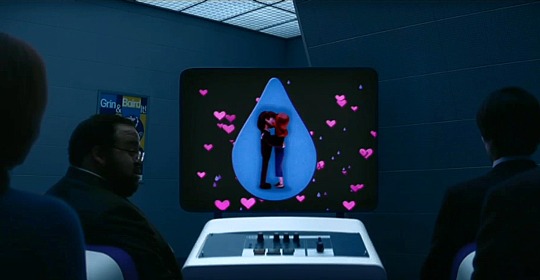
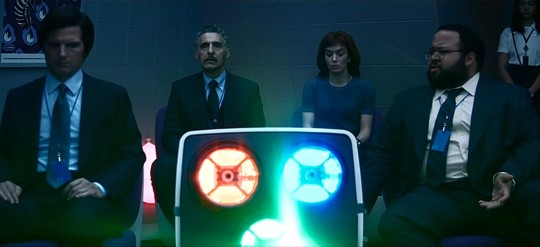
it's not just documented, but celebrated. used as propaganda for how the conditions on the severance floor have improved. proof that the severed workers are happy. and how even though he is unaware of the sociopolitical meaning of all this, lumon is very not-subtly telling him that what he had with burt is inherently lower and less valuable than this.
irving doesn't even know homophobia exists and yet he is still affected by it, it still seeps into every corner of the way his and burt's romance progresses. burt is positioned as an unacceptable love interest from the jump. irv is actively discouraged at every turn from pursuing it. their friendship is viewed with disgust and apprehension from their coworkers. burt working in a different department that's hated by MDR. dylan himself not being homophobic in the sense he opposes their relationship because they're both men but his attempts to keep them apart still has a parallel sort of prejudice behind it and still ultimately has the same effect as if it WERE driven by homophobia. irving is made to feel perverse for wanting contact with burt. he's told this is for his own good.
and then, just as they manage to overcome that immediate resistance from their peers and escape to a place where they can explore this blossoming romance on their own terms, burt retires. for all it matters to irv, he's dead. and then irving is given the option to live the rest of his life with grief that will never heal, or kill himself too, because there is no reality where they get to be together. that's just the way things are. of course they wouldn't get to be together. he was unreasonable and childish for ever hoping that could happen. this is just the way it goes for innies. he's told to get ahold of himself and not make a scene.
but the thing is, the standards are not the same for all. a heterosexual romance gets upheld as the shining example of success and fulfilment for the severed employees, whilst a homosexual romance is ridiculed and invalidated, and written off as something that was simply never meant to be. and even more importantly to irving, a heterosexual romance is APPROVED OF by lumon, and by extension, by kier. irv held back from allowing himself to even call his and burt's relationship a romance, because his god had told him it was wrong, he followed the handbook, thinking this was what kier wanted, and then finding out after suffering the worst heartbreak imaginable because of it, that this WASN'T EVEN TRUE. it's simply just that someone like HIM doesn't get to have something like this. his love is not the kind of love god wants. he does not approve of irv's love. cynical and manipulative though that approval may be (even within the context of the corporate video, the helly/mark romance is only being celebrated to further the narrative that lumon care for their workers, but the point still remains that it was THEIR romance specifically used to suit this end), when your entire life has been in pursuit of that approval, it must be devastating to learn it was never on the cards for you.
he and burt even used the fact kier met and fell in love with his wife in the same circumstances as them to justify this to each other - and they were RIGHT, god does approve of falling in love with your coworkers - this simply just doesn't apply to them specifically. and if irving needed any more proof that he no longer has a place at lumon, that he's better off not existing at all than existing with this pain that cannot be remedied, pain that won't even be acknowledged for what it is, a symptom of a sickness which plagues the entire severance system, pain that he is simply expected to choke down and get over - this is that proof.
and that's the POINT. they're TELLING us that this is unjust, and there's a double standard. they're using the ways the innies experience romance and the difference in lumon's reaction (lumon being the collective of all the management we've seen, lumon as a singular entity) to burt/irving vs helly/mark to comment on how queer people are not afforded the same level of respect or validation IN REAL LIFE, for their attachments, their love, their pain, their suffering. it is NOT just incidental that irving's romance is with a man. it would not WORK if his love interest was a woman. the POINT is that they are both men and how that puts them at a disadvantage, even if they aren't aware of the prejudices of the outside world, even if they don't TECHNICALLY apply on the severance floor, there are very clear analogues which still end up oppressing them in equivalent ways that they would be suffering if this were a normal workplace in the outside world.
it genuinely sickens me to my stomach that even in a world so divorced from reality and the sensibilities of regular society, a queer couple is still made to suffer and feel inferior in a way that perfectly mirrors their real-life counterparts. how they will never, EVER be allowed to exist in a world where their love could thrive freely and uninhibited - they never get to taste the joy our world has to offer people like them, but they are still somehow subjected to all the pain it has to offer them regardless. it's such horrifically devastating writing. it makes my skin crawl. I can't stop thinking about it
#TO BE CLEAR i am not trying to claim that lumon do genuinely want helly and mark to be a couple#they very begrudgingly co-opted this display of affection and camaraderie to suit their own ends#like i say. the approval is cynical. its purely utilitarian.#however the fact it CAN be used to further their narrative that severance is a good thing#whilst severance itself has brought nothing but pain to irv and his romantic endeavours#is very telling. its very fucking telling#especially from irvs perspective specifically here. this is how HE'D see it#as someone who puts so much stock in what kier would think of him. someone who based his entire identity#on following his doctrine to the letter. how he would see the one real true thing hes ever experienced written off like this#whilst another couple is inexplicably celebrated. i mean just look at his dead eyed stare in that sc.#this broke him. this was his final straw#anyways im not nearly intelligent or well read enough to do a thorough analysis on exactly how#religion plays into irvs mindset and his character arc#these are just thoughts on the hypocrisy shown by lumon on the romance thing specifically#clocking into writing meta for this show like its a 9-5. its so serious.#severance#severance spoilers#severance season 2#meta tag#wails from the abyss#irving bailiff#burt x irving
443 notes
·
View notes
Note
Hi hi! Do you think by any chance you could do a list of serious/refined sounding names with a cute nickname? For instance Victoire turning into Vicky. Sorry if this is too big an ask, but ty nonetheless and I hope your day is going great!!
Refined Names with Cute Nicknames
-> feel free to comment suggestions, I'll do my best to add them to the list.

Male:
Sebastian → Seb, Baz
Frederick → Freddie, Rick
Theodore → Theo, Teddy
Maximilian → Max, Milly
Alexander → Alex, Xander
Nathaniel → Nate, Niel
Dominic → Dom, Nicky
Vincent → Vince, Vinnie
Alistair → Ali, Lissy
Leonard → Leo, Lenny
Elliot → Eli, Lio
Benjamin → Ben, Benny
Nicholas → Nick, Nico
Christopher → Chris, Kit
Dominic → Dom, Mico
Reginald → Reggie, Reg
Samuel → Sam, Sammy
Zachary → Zac, Zack
Julian → Jules, Jay
Nathaniel → Nate, Nat
Frederick → Freddie, Rick

Female:
Genevieve → Genny, Vivi
Evangeline → Evie, Lina
Alexandria → Lexi, Andy
Anastasia → Annie, Stasie
Isadora → Izzy, Dora
Seraphina → Sera, Phina
Marguerite → Maggie, Daisy
Octavia → Tavi, Via
Wilhelmina → Mina, Willa
Theodora → Teddy, Dora
Caroline → Carrie, Lina
Clementine → Clem, Minnie
Penelope → Penny, Nell
Elizabeth → Lizzy, Ellie
Arabella → Bella, Ari
Charlotte → Charlie, Lottie
Josephine → Josie, Phina
Rosalind → Rosie, Lindy
Adelaide → Addie, Della
Beatrice → Bea, Trissy

Gender Neutral:
Avery → Avi, Ree
Cassidy → Cass, Sid
Bellamy → Bell, Amy
Julian → Jules, Juju
Vivian → Vivi
Quentin → Quinn, Q
Remington → Remi, Rem
Finnegan → Finn, Finny
Adrian → Addie, Rian
Emerson → Em, Sonny
Jordan → Jordy, Jory
Harper → Harp, Perry
Dakota → Kota, Dax
Rowan → Ro, Roni
Parker → Park, Pipp
Casey → Cas, Cee
Reagan → Rea, Gan
Ellis → Eli, Elle
Morgan → Morg, Mo
#character names#character name ideas#name ideas#name suggestions#name list#character name analysis#oc names#ocs#oc name ideas#writeblr#original character#creative writing#ask box prompts#nicknames
425 notes
·
View notes
Text
Something I've always found kinda interesting about Red and Green in gameverse is how they turn some of the Stock Shōnen Protagonist/Rival tropes on their heads.
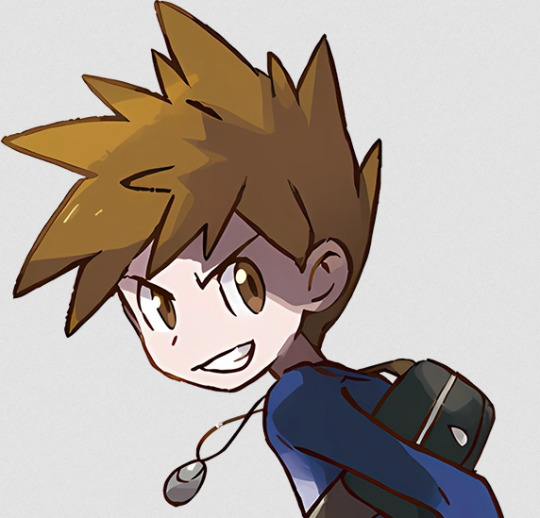

This is really long character analysis of these two and various media counterparts of theirs, so I'm gonna stick it under a cut.
In some ways they fit their roles quite well - aside from the obvious colour associations, you have Red as the hero whose sense of justice is stronger than his sense of self-preservation, and you have Green as the privileged rival who cares about beating Red above all else.
But, if you look at it another way - Green's got the light spiky hair, the hot-headed and boisterous personality, the drive to Get Better And Win. He's designed to read as really open and chipper, yet snarky. Sure, he isn't dumb, but he's arrogant, and he's got something of a one-track mind; the guy finds himself in the middle of a hostage situation because he's just that hellbent on fighting his rival, and does not seem to be thinking about anything else. He's also got a motivation - given how the Professor talks to him in the championship room and supplementary material like his Generations appearance, it's not a stretch to think the reason he's so driven to Get Better And Win is to prove himself to his grandfather. It's shown in later games and supplementary works that he's become somewhat of a mentor as he got older and wiser.
Red, on the other hand, is a quiet loner whose only motivation seems to be to get stronger for the sake of getting stronger. He's level-headed and dark haired, his cap rounding off his edges and obscuring his face. He's heroic, but not really sociable, as evidenced by the fact he spends the Johto games alone on a mountain without having told anyone where he went. He seems isolated in a way that later games' protagonists really don't. He may have always been a step behind Green, but he's always better.
Equally fascinating to me is how other adaptations have changed the base designs around and rewritten personalities to suit different purposes, while still being visually recognisable as counterparts to their game-selves.

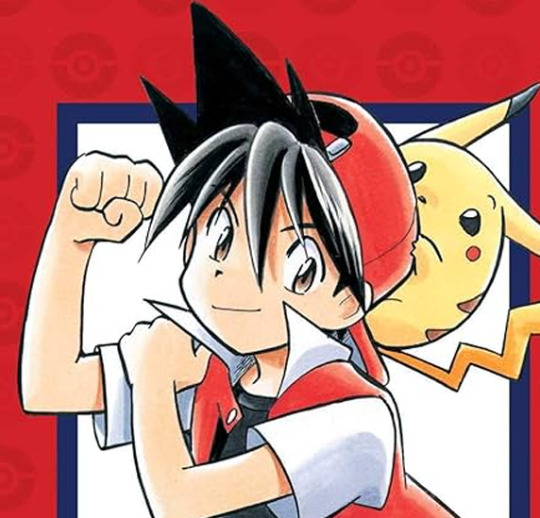
For example: Red and Green's counterparts in Special slot WAY more neatly into their stock shōnen roles, with Red as the boisterous hero and Green as the broody rival, and it's reflected in their new designs.
Red's hair becomes spiky to reflect his more excitable nature. His hat, in turn, never obscures his face; it's always either tilted back to accommodate his fringe or turned backwards. Green's hair, on the other hand, is not quite as spiked upwards and instead falls into his face, frequently obscuring his far eye in the same way game!Red's hat does.
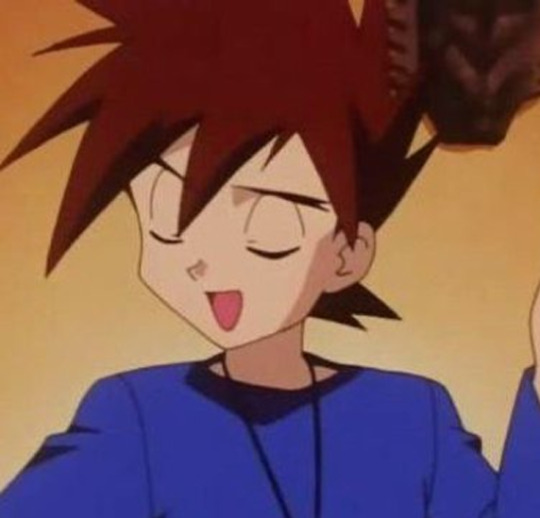
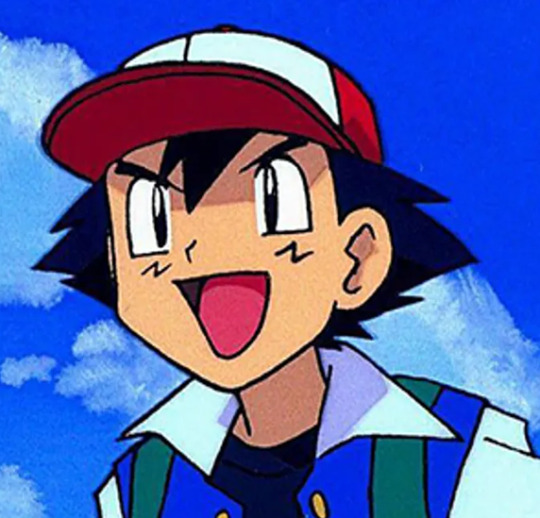
And then, of course, the anime balanced them in a totally different direction.
Instead of scrapping Green's personality wholecloth, it's become exaggerated in Gary. He's not the broody antihero rival, he's the arrogant, privileged, better-than-you rival. He's always ten steps ahead of Ash, always pisses him off, and is ALWAYS better until the end of his run. The anime also emphasises his intelligence far more, with him doing things like rattling off dex info and the speed of light in mph off the top of his head, to further contrast him with Ash.
Ash, who is of course THE shōnen protagonist. He's dumb, but determined, and always ready to help people in need. Unlike game!Red, the power of friendship (with more than just pokémon) is central to him; any given season of the show is defined as much if not moreso by his travelling companions and interpersonal relationships as it is by whatever he's actually doing.
It's funny to me, though, how most adaptations seem to find the fact that gameverse Red and Green have swapped some stock roles as something to fix. Even Origins, which is probably the closest a high-profile adaption has come to game-accurate, made its version of Red louder and more standard-hero-esque.
I'm not knocking any of these things, of course, just observing. I adore both Special and anipoke. I just think that the way the game characters are written could lead to some interesting dynamics were it to be explored more.
#pokemon#reguri#pokespe#pokeani#anipoke#trainer red#rival green#blue oak#dexholder red#dexholder green#ash ketchum#gary oak#character analysis#sorry not sorry for writing an essay on a whim. it will happen again#namelessshipping#originalshipping#palletshipping#kindanotreally#but i think yall will appreciate my char analysis of them as a dynamic yknow. i am one of youse#dent's meta
2K notes
·
View notes
Text
The Daycare Attendant and Their Dialogue
A little ramble on some of the things I've noticed about their ways of speaking. This post ended up being predominantly about how they refer to one another. Most of this is speculation mixed in with my own views on them and their relationship, without discarding some other possible alternatives (for instance, although I do view them as two AIs that heavily rely on each other to function properly, I do not cast aside the interpretation that they are the same person).
(note: although I have played SB and Ruin, I did not play HW2 myself. All I know about that game has been through let's plays).
Sun is, obviously, the chattier of the two. Not only are his sentences longer, he speaks more of them in a row than Moon does - in fact, we only see Moon going on and on in Ruin (which we will discuss later).
Both of them use a lot of repetitions when speaking. From their infamous "clean up, clean up" line, to Sun's panicked "you like glitter glue? I have glitter glue!" and "light's on! Light's on! Keep the generators on!", to Moon's "hidey hide, hide away" and "bad children must be punished. Bad children must be found", "knock knock", etc. One of the first things Eclipse says is also a repetition ("warning, warning"). They appear to occasionally rhyme their words too, or at the very least use similar sounds in their sentences. This is a robot that works with young children, so it's not surprising.
On that same vein, their main insult to misbehaving children (and employees... or at least Cassie's dad) is also a repetition: "naughty, naughty" (which turns into "naughty boy" for Gregory), "rulebreaker, rulebreaker", and "bad kid, bad kid". In fact, it appears they repeat words more often when they're mad/stressed (Sun's no no nos, Moon freaking out in Ruin). Taking into account they get mad pretty easily when things don't go their way, it's not surprising we hear it so often, but it's neat.
Although both of them speak in an almost song like manner, with Sun's run on sentences flowing well between one another, Moon is the one where this is more evident due to how much shorter his lines are.
Moon is also the one who speaks in a more childish manner. Not only are his phrases shorter, he doesn't articulate them as much as Sun does, and seems to prefer shorter words and sounds, especially giggles. This makes Sun appear more developed. Key word being appear.
Sun tends to speak as if he's entertaining a crowd, doing his best to keep the attention on himself while trying to keep it fun. This is most evident in his level explanation parts in HW2, but it's also clear in SB. In Ruin, this is absent for... obvious reasons.
Both of them are somehow direct in their way of giving orders/saying what they want to do. When they can't be direct, they find workaround truths in order to conceal what they truly want to say, while keeping the main order clear (such as Sun saying the player will hurt their eyes if they work in the dark and ordering them to keep the lights on, rather than saying Moon will kill them so keep that room bright. Direct, but nicer).
Not at all important to FNAF speech lore but I think it's funny: Sun says the infamous Vanny line during the daycare intro section. "Are you having fun yet? (Are ya, are ya?)". 0.5 seconds after Gregory just stands there, which coincidentally is what Vanny does 0.5 seconds after Gregory gets into a vent (numbers exaggerated). I don't know. I just think it's funny. Replaying the daycare section after hearing Vanny yapping that line non stop gave me flashbacks.
The way they refer to each other and the pronouns they use are an entire thing, so let me separate it in two parts.
So that this post doesn't become scrolling hell on the tags, I'll keep it below the read more line:
Sun
Sun is the one who refers to himself the most. He frequently uses "I" or "me" when talking about himself, and does it way more often than Moon. Examples of this are "I have glitter glue!", "I'm stuck in a nap", "it really speaks to me", "I feel dumber just looking at it" - you get the point by now. The reason I'm going hard on this point is to contrast his way of speaking to Moon's.
When it comes to him referring to Moon, we only ever hear it twice. In HW2 he says "He'll wake up if the lights go out!". In Ruin, he says "Not me, the other me!". Besides those two voice lines, he merely alludes to Moon without ever mentioning him by name or by pronouns (such as when he says he'll turn the lights off himself, implying he'll let Moon deal with you, or when he says you can't work in the dark and instead of saying the real reason as to why, he cuts himself and goes "You'll- hurt your eyes if you work in the dark").
This is interesting for two reasons: one, we only see him directly mention his counterpart when he's in a ruined state (the HW2 voice line comes from the mask off section, when they're broken down. At least I think so); two, he simultaneously views Moon as separate from himself ("he'll wake up") and as a part of himself/another side of himself ("the other me"). You can take that as them really being the same "person", or as a reflection of their complicated body sharing situation. Take it as you will.
As far as referring to himself and Moon at the same time, he only does it in Ruin when he states "We need to be whole".
Moon
The way Moon structures his sentences means that he seldomly actually refers to himself directly. For instance, he doesn't say "I will find you" or "I will punish you", putting himself as the subject of the sentence. Instead, he puts others as the subject, wording it as "Bad children must be found" and "Bad children must be punished". This is consistent across all of his voice lines except one... Well, technically two.
To get it out of the way: there's a deleted voice line where he says "I'm putting you in time out", a line he and Sun share and which worked the same way the clean up one does - them saying the same thing, a push towards them being the same person ordeal.
The only in-game time he refers to himself directly is in Ruin. This line is also the only time he refers to both himself and Sun as a duo. This line is also the longest line of dialogue Moon has.
"(groaning noises) Naughty! Naughty! Make it stop! The light makes us hurt! Grind Grind! Grinding gears inside my head! We can't move. Error! Error!"
This line, much like Sun's, is interesting for various reasons. Even though Sun is no longer with him (being stuck in the VR world and separate from Moon, shown by how Moon can't move because the lights are on but his body can't shift into Sun, so he's completely stuck), he first refers to himself as a "us" - adding Sun into the mix. Then he refers to himself alone, "my head" instead of "ours", before going right back to a plural.
We can assume one of three things here: one, Moon refers to himself as a we more often, adding Sun into the mix, a complete opposite of his counterpart who typically speaks in singulars; or two, Sun is not as absent as he appears and in that moment he is in fact with Moon, just stuck on the passenger sit, hurting alongside him; or three, this is merely an effect of this being in the Ruin DLC where the whole point of the daycare section is to fuse Sun and Moon into the Eclipse, so the writers decided to bring the point home further. If you have more options, feel free to add them.
Side note: This voiceline also shows Moon's speaking patterns pretty well. Putting "the light" as the subject instead of "we/I", the rhyming, the repetition, the clipped sentences compared to Sun's endless ones, the noises, the scratchiness, the vague childlike mannerism... All ending with "we can't move", way more straight to the point, said right before he freezes up, which deviates from the "other subject first then me" rule due to the pain tearing through him at the moment.
Moon does not call Sun "the other me" or anything similar in any of the games. He never refers to Sun as if he too was Sun. However, we can assume his view on their situation probably mirrors Sun's - being in the same body and all -, so take it as you will.
And as for Moon referring to Sun as a separate individual... He does not refer to him as a "he". Instead, he actually mentions his counterpart by name, saying "No more Sun". Meaning he's the only one of the the two that has canonically used his other side's name. I think it's interesting how the least chatty one is the one actually calling the other by name and not the other way around. And yes, you can say it's a way of speaking and he's referring to the concept of the sun rather than saying his name, but taking into consideration Sun never utters the word moon, I'd say it's still quite a big thing.
In my headcanon land, due to the happenings at the Pizzaplex, Sun is probably too embarrassed and mortified to even mention Moon. Moon, on the other hand, has no reason to have such troubles besides hating Sun for (in his perspective) keeping him locked in a prison of light. So for me, it makes sense we never see Sun saying Moon's name, and it makes it more impactful when he actually acknowledges Moon as the other me rather than a he.
Eclipse
I lied there's three parts.
Eclipse has very few voice lines. The only one that matters here is "We need to clean this place up before we can open in the morning." This is pretty straight to the point: Eclipse, unlike Sun and Moon, doesn't use an "I". They immediately speak in the plural. They do not view themselves as just Eclipse, but rather as both Sun and Moon combined, at the same time.
As for the DCA being two AIs or one... in Ruin, Sun thanks Cassie after Eclipse is activated. It's left ambiguous. You can say Sun speaking afterwards proves they're not one and the same, "with the Sun and Moon AIs still running separately somehow", or you can assume Eclipse existing doesn't mean Sun and Moon can't keep doing their thing under safe mode, albeit in a less chaotic manner, allowing Sun's voice to come through but not making him any less Moon - he is Moon, he is Sun, and they are complicated yet very simple.
I believe in whichever version is more convenient at any given time, with a preference for "two codependent AIs" given what the games show us. Although, going by everything I collected here, the only theory I believe to just not be supported by canon at all is the one with Eclipse as a separate thing all together. Eclipse refers to themselves as a "we', not an "I". Eclipse activates when you make Sun and Moon "whole". It canonically makes no sense for Eclipse to be a third thing. (Please remember this is a post about what's in the games, the canon of FNAF. AUs and fandom or whatever, you do you).
That's it. Hope you enjoyed my rambling. Uh artblog unpaid promotion @tagidearte thank you for making it this far.
#dca#fnaf#daycare attendant#fnaf moon#fnaf sun#sundrop#moondrop#fnaf eclipse#fnaf security breach#fnaf ruin#help wanted 2#hw2#if you wanna know#I spent time on this because...#I am writing two fics for them (just them and other canon characters)#and although Sun's dialogue comes easy to me#I did all this analysis just to be able to write moon's#never say fanfic doesn't make you look at stuff in ways you'd never really do otherwise
682 notes
·
View notes
Note
Since you mentioned this in an earlier ask, what is your take on feminist Leona? I see people saying things like "consent king" "he drinks his respect women juice" and "leona kingscholar says men ain't shit" but I think those are mainly jokes but I've also seen a lot of for example Leona x reader fanfics where he's a lot nicer to femme Yuus than masc ones. I don't play the game so I don't know how much of a feminist he really is, could you clarify and give your own insights? Ty Miss Raven!!!!!!!
[Referencing this post!]

Admittedly, I am guilty of having made “consent king” jokes but that’s mainly because I think consent + respecting others’ autonomy is very sexy important and it’s slightly funny to have a 185 cm muscular anime cat boy championing the concept. However, I try to avoid making jokes which would imply Leona puts down his own gender or thinks lesser of them because 1) canon doesn't indicate this and 2) it can be hurtful to non-femme Twst fans. Yes, most of the fandom is women--but that doesn't mean we shouldn't make this fandom space welcoming for masculine or nonbinary Twst fans.
Let's delve into a brief history of where feminist!Leona comes from! After that, I'll discuss my own thoughts and feelings about it.
The idea first came into prominence because of an exchange that occurs in Cater's School Uniform vignette. In it, Cater is trying to convince Leona to join him for a party that he's throwing for Rosaria, one of the talking paintings at NRC. At first, Leona refuses--but he quickly changes his tune once Cater mentions Rosaria is a "she/her". Leona states, "Portrait or not, I respect ladies and Rosaria is a lady." Cater then whispers to Kalim (who is shocked that Leona suddenly agreed to come along), "Leona's kingdom is all about being respectful to ladies."
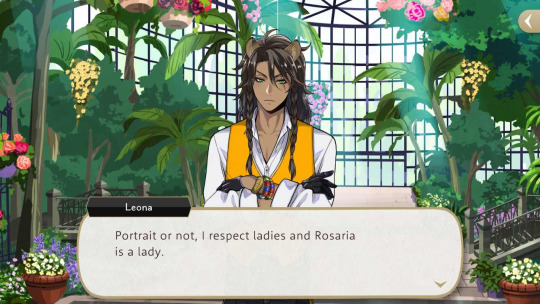

It should be noted that Leona says something slightly different in JP: “Even if it’s a portrait, a woman is a woman.” JP does not have the “I respect ladies” portion; “I respect ladies” was added to EN, which may have further amplified the interpretation that he is a feminist.

Now, as we learn from that vignette, the Sunset Savanna has a culture of "respecting women". In Leona's Ceremonial Robes vignette, he elaborates that, “[Beastwomen are] already way stronger than [beastmen]." Furthermore, Ruggie states in one of his Chats that “Girls have both the grit and the camaraderie to triumph when the goin’ gets tough.” Then, in events like Tamashina Mina and late in book 7, we are told that many of the royal guards are women who volunteer for the positions and it's common for them to have learned martial arts from a young age. From this dialogue, we can glean that the women of Leona's home country are physically strong, strong-willed, and honorable.


With that being said, I think certain interpretations of Leona's "feminism" (a term not actually used by official materials; this is a fandom take) definitely take it a step too far by either assuming Leona treats woman as a special class and/or he dislikes men. Both of those interpretations (if serious and not said as a joke) are owed to a fundamental misunderstanding of what "feminism" is. Feminism is "the belief in full social, economic, and political equality for women." Feminism is NOT misandry (a hatred of men), and nor is it female chauvinism (the belief that women are superior to men)... unless, of course, you're talking about very radicalized forms of thinking. The basic concept of feminism doesn't involve man hate or putting women on a pedestal.
Twst itself appears to go with the basic definition of feminism. As Leona himself states, he doesn't treat anyone special. "I ain't extra nothin' to nobody. As if [women] even need men fawning all over'em."

Leona, whom we know to be arrogant and unwilling to obey others' orders, appears to be more willing to listen to and carry out tasks if there's a woman involved. I already mentioned the case with Rosaria the painting (which proves that his "respecting women" thing extends beyond just beastwomen from his home country). In his Ceremonial Robes, he also grumpily puts on the aforementioned robes and takes a picture of himself in it upon the request of his sister-in-law. But--and this should be stressed--he's not exactly jumping for joy or eager to do so. Instead, Leona cites that "Goin’ against [beastwomen] only brings more trouble.” This indicates annoyance at having to carry out this chore, and gives the impression that Leona's only complying because not doing so would only overcomplicate things for him. He's not an idiot--he knows when to make a strategic retreat if it's going to save him time and effort in the long run. (For example, he immediately surrenders to the Ferrymen in book 6 rather than continue to put up a fight.)
I should note that, like in the earlier definition of feminism I shared, Leona does not simply bend the knee to every single woman. In the first Halloween event, he was still capable of scaring off the Magicam Monsters (some of which have distinctly female voices) without any qualms. He was still fully able to express anger and upset when Eliza, the Ghost Bride, smacked him. "You've got a lot of nerve turnin' me down over some nonsense!" He's also not above tricking the Fairy Queen and her entourage to steal back the special magestone from NRC.

This shows us that Leona doesn't just... "respect women" indiscriminately. If someone is going to be rude and selfish to him, he's going to respond as is appropriate. He's not going to turn a blind eye because of the offending party's gender.
In terms of Yuu interactions (assuming Yuu can be any gender), Leona acts pretty aggressive towards them in their first meeting. Even though it's clearly an accident and Yuu didn't realize they stepped on his tail, Leona is annoyed by the act and them walking away without apologizing or stopping to acknowledge him. He also makes it known that Yuu is magicless, and thus has no way of defending themselves from him. And you know what this man does? He says, "Well, can't say it'd be much fun to hurt someone so helpless. Still gonna do it, though." AND HE THREATENS TO TAKE A TOOTH. His wording, "No one gets to stomp on my tail and just walk away without payin' the price" + him still deciding to attack Yuu desite knowing they are weak/cannot fight back, implies to me that he may have still reacted this way regardless of Yuu's gender. (Key word: MAY. We don't know if this is the truth or not, I am leaving this up to your interpretation.)



Notably, there is a light change between EN and JP versions for Yuu's dialogue choices in response to Leona's threat. The EN dialogue options are far more humorous, but the JP options clearly convey fear (ie Leona is being serious about his threat of bodily harm). The top option is like noises of surprise, like "Eh, eh, eh!!"; the bottom option is along the lines of, "What, I'm going to be hit/beaten!"


There are, in fact, multiple instances where Leona acts callous towards Yuu. He refuses to let Yuu stay in Savanaclaw unless they earn their keep by beating up some mobs. He constantly degrades them by calling them and others he considers weak "herbivore". He has to be goaded into helping us or taking us along on trips instead of automatically caving. It could be argued that he would be more agreeable or polite if fem!Yuu was in these scenarios. And who knows, that might be the case--but again, I don't think he would be egregiously kind. I would like to point out a more direct example of a Leona-fem!Yuu interaction. Leona has interacted with a female Yuu before: Yuuka Hirasaka, our main character for the Episode of Savanaclaw manga. There's some debate over whether or not the NRC students know that Yuuka is a girl since the topic is never mentioned once, but I assume that they are aware because: 1) Yuuka makes no effort to hide her figure or chest; she even wears her blazer open, and 2) she has no motivation to hide her gender; she is capable of defending herself if needed and has a nonchalant personality. Proceeding with the assumption that Yuuka being a girl is a known fact, Leona does not treat her any differently than any other student.
Yuuka seems to experience the same tail-stepping scene as is depicted in game, although we don't see the aftermath of it/if Leona gives her the same threat.


The more telling scene for Yuuka, however, comes when she and her friends arrive in Savanaclaw to investigate. They are confronted by a bunch of mobs that start to pick a fight with them. Like in the game, Leona intervenes (ie he doesn't stop the fight just because Yuuka is a woman) and has them duke it out in a game of spelldrive/magift instead.


And you know what? Leona doesn't hold back just because he's playing against a woman. In fact, he kicks Yuuka's ass and then some. Then he stands over her and tells her to get back up, to keep playing. Leona isn't cutting Yuuka any slack whatsoever. He treats Yuuka the same as the boys she's playing with.


This brings me to my final prominent example of Leona interacting with a woman, which I think best exemplifies what my interpretation of Leona's "feminism" is. In the JP server's 2024 Halloween event Lost in the Book with Nightmare Before Christmas, Sally indicates that she plans on making a meal using the plants from around the cemetery. Leona is at first displeased by this, but then agrees to help her catch snakes, rats, lizards, etc. as meat for the meal. This leads into a conversation about how sad Sally's home life is, which earns her sympathy from the other NRC students. Jade, Riddle, and Epel are shocked at the cruelty that Sally faces. Jade volunteers to take the doctor out for Sally, and Epel even tries to convince Leona to help him rough up Dr. Finkelstein. But Leona just smirks and tells them Sally's not in any need of their "help"; isn't she the one who slipped the doctor a "drink"? Riddle scolds him for this "ungentlemanly" behavior and Epel refuses to believe that the "kind Sally" would do something like use poison. Leona was able to smell the deadly nightshade on her and deduce that Sally slipped some to her guardian and then slipped out on her own. She's not a damsel in distress--she's resourceful. Sally used her brains and not brute force to rescue herself from a bad situation. (We know that this would deeply resonate with Leona because he has been struggling his entire life to have his own merits recognized.) Leona praises Sally for her cunning and goes so far as to offer her his arm and tell her that he's looking forward to this evening's dinner.
In this situation, could it not be said that Jade, Riddle, and Epel were the ones assuming Sally is weak that Leona was the one who saw her true worth? I'm of course not accusing anyone here of being sexist. Society socializes us to see women as the "fairer sex" in need of protection and aid--but isn't Leona being more equitable by not underestimating Sally because of her gender?
That brings me to my conclusion. Leona respects women, no doubt about that. However, that's NOT a blanket statement. He clearly knows how to separate who is worthy of his respect and who isn't, and then he acts accordingly. Yes, he is polite, slightly softer, and more willing to listen to women he knows (his sister-in-law), women who haven't offended him/are just existing (Rosaria), and woman who have demonstrated their own strengths to him (Sally). He doesn’t become a completely different character just to bend to the whims of women. Those who have acted in ways to earn his ire, woman or not, will be treated as such (Magicam Monsters, Eliza, even Yuu when they/she enters his territory and/or steps on his tail). At the same time, I don't believe he thinks that women are delicate flowers that need special treatment (as we see with how he handles Sally + the Yuus and, more specifically, Yuuka). If anything, the women from his home country have demonstrated that they can be strong and self-sufficient. Why would he feel the need to go out of his way to be extremely lenient with the women he is around?
Lastly, nothing in official materials implies Leona treats men significantly worse than women. If he seems exceedingly rude to men, it’s most likely the result of the main cast (the characters Leona most often interacts with) being guys. If we were to compare how he treats his peers and how he treats women who have irritated him, I would say the behavior isn’t that different.
I know that was a long post but 😅 Hopefully I was able to articulate my thoughts well enough… May you find it helpful in forming your own opinion, Anon!
#disney twisted wonderland#twst#disney twst#twisted wonderland#Leona Kingscholar#Ruggie Bucchi#Ghost Bride#Hirasaka Yuuka#Yuuka Hirasaka#episode of savanaclaw#episode of savanaclaw manga#jp spoilers#lost in the book with nightmare before christmas spoilers#Riddle Rosehearts#Epel Felmier#Jade Leech#Cater Diamond#Cater school uniform vignette spoilers#Leona ceremonial robes vignette spoilers#terror is trending spoilers#ghost marriage spoilers#fairy gala spoilers#Yuu#book 2 spoilers#notes from the writing raven#question#twst analysis#twisted wonderland analysis#twisted wonderland character analysis#twst character analysis
445 notes
·
View notes
Text
Fun Ways for characters to be wrong #1
Making quick assumptions without all the facts
Mistaking symbols or signs for something else
Using flawed reasoning or faulty logic
Ignoring obvious clues or hints
Believing in superstitions or myths that aren't true
Being overly confident and proven wrong
Exaggerating their experiences or accomplishments
Remembering events inaccurately or mixing up details
Trusting unreliable sources or false information
Falling for pranks, deceptions, or illusions
Underestimating the abilities or intentions of others
Mispronouncing words and causing misunderstandings
Making wild predictions about the future that don't come true
#writer on tumblr#writing#writerscommunity#writing tips#character development#writing advice#oc character#writing help#creative writing#writing block#funny traits#funny writing#character analysis
1K notes
·
View notes
Text
Flowey’s so funny and has me so fucked up like he’s a talking flower. He tries to kill you upon your first interaction. He is ten years old. He is damaged beyond repair. He’s a flower named Flowey. He’s become friends with every single character. He’s killed all of them countless times. He knows everything about everyone. He doesn’t care anymore. He takes care of his mom when she can’t take care of herself. He’s killed her before. He doesn’t care if you kill her. He thinks she’s trying to replace him. He just wants to be himself again. He wants to destroy everything. He hates you. You’re the only one who understands him. He wants his best friend back. He’s terrified of them. He believes in kill or be killed because he died by giving mercy to the wrong person. He believes himself to be the wrong person. He doesn’t understand when you show him that kindness he showed others, even when you know he could kill you for it. He’s tried every route. He asks you if you have anything better to do when you try to do the same. He’s a direct reflection of the player. He’s a fucking talking flower named flowey and his only voice line is by Ronald McDonald and his officially licensed plush does a little dance for you
#‘Flowey would listen to i bet on losing dogs by Mitski and cry until he throws up and Chara calls him cringe from beyond the grave’#-me to my friend when I ranted about this last night#he has me so fucked up like oh my god#how is the best character a fucking talking flower#I love undertale’s writing so much like it’s mastered minimal evidence giving away the biggest parts of characters#i can analyze him i can study him under a microscope#i can put him in a terrarium with a sticky note that says gay baby jail you know#he has me SO fucked up#flowey#flowey the flower#asriel#asriel dreemurr#I’m talking about flowey btw not asriel i know they’re the same person but not to me#like how i consider little baby me and fucked up 13 year old me different people#asriel sits on the playground and cries when nobody wants to play warrior cats with him#and flowey sits in the back of classrooms and answers ‘life is MEANINGLESS’ to every question#not speaking from experience ofc (im lying)#love my edgy flower *puts a magnifying glass up to him and notes how fucked up he is*#i think more characters need to be fucked up beyond repair#undertale#utdr#character analysis
7K notes
·
View notes
Text
"Toshiro Is Sexist," "Toshiro Owns Slaves": What's Really Going on With This Guy?
I've seen a lot of debate on whether or not Toshiro is problematic because he's a slave owner or because he's sexist in the context of his crush on Falin. While I do want to examine his relationship to Falin, I'd like to take a few steps back and unpack his upbringing first. We'll dive into the gender and class dynamics he was raised with and how it impacts his behavior in the main storyline.
Like all people, Toshiro is shaped by the environment he grew up in. Toshitsugu, Toshiro's father and the head of the Nakamoto clan, is the most impactful model of authority and manhood in his life. Toshiro does recognize some of his father's flaws and tries to avoid replicating them. But whether or not he emulates or subverts his father's behavior, Toshitsugu is often the starting point for Toshiro's treatment of others, particularly marginalized people.

The Nakamoto clan exists under a patriarchal hierarchy with Toshitsugu at the top. As noted by @fumifooms in their Nakamoto household post, his wife has more authority than Maizuru. She's able to ban Maizuru from parts of their residence, but despite disliking his infidelity, she can't divorce him or stop him from cheating on her. Their marriage is not an equal partnership.

On an interpersonal level, Toshitsugu and Maizuru also have a fraught relationship. While she does seem to care for him, she's often frustrated by his thoughtless behavior.
For example, he drunkenly buys Izutsumi for her — without considering how she'll have to raise this child — and invades her room in the middle of the night. When he cryptically says, "It's all my fault," she replies, "I can think of a lot of things that are your fault." She calls him an "idiot" and "believes that [Toshiro] will grow up to be a better clan leader than his father," implying that she takes issue with Toshitsugu's leadership.


Because Maizuru and Toshitsugu are described as being "in an intimate relationship" and "seem[ing] to be lovers," Maizuru appears to be a consensual participant. Still, this doesn't negate the large power imbalance between them as a male noble clan leader and his female retainer. This imbalance introduces an insidious undertone to Maizuru's frustration with Toshitsugu. Like Toshiro's mother, Maizuru doesn't have the agency to do as she pleases in their relationship; he has the ultimate authority. For instance, she doesn't seem to want to raise Izutsumi, but she has to anyway.

While Maizuru's role as Toshitsugu's mistress is significant, she's also the Nakamoto clan's teacher and Toshiro's primary maternal figure. She cares deeply for Toshiro: tailing him, feeding him, and taking responsibility even for his actions as an adult. While it might seem sweet that she cares for him like a son at first, Maizuru was notably fifteen years old at the time of his birth. In the extra comic below, he's six years old and has already been in her care for some time. Even if we're being generous and assuming that she didn't start raising him until he was six, she was still only twenty-one at the time she was parenting her boss/lover's child with another woman.

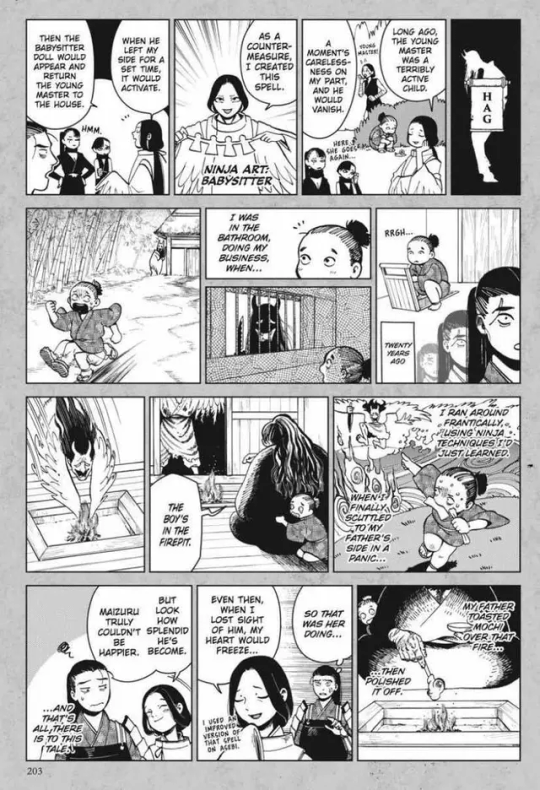
Maizuru's roles as mistress and maternal figure, in addition to her role as retainer, demonstrate the intersection between gendered and class oppression in the Nakamoto household. Despite her original role being a retainer trained in espionage, Toshitsugu presses her into performing gendered labor for him and eventually, Toshiro. She's expected to be Toshitsugu's lover, perform emotional labor for him as his confidant, care for his child, and carry out domestic tasks like cooking. She says, "Even during missions, I was often dragged into the kitchen." If she was a male servant, I doubt she would have been expected to perform these additional tasks. She can't avoid these tasks either, stating that her "own feelings don't factor into it."


Toshitsugu disregards his wife's and Maizuru's desires and emotions to serve his own interests. Because he has societal power over them as a nobleman and in Maizuru's case, her master, neither woman can escape their position in the household hierarchy.
As a result, Toshiro grew up within a structure where men and male nobility, in particular, wield the most societal power. The hierarchical nature of his household and society discourages everyone, including him as a clan leader's eldest son, from questioning and disrupting the existing hierarchy.
The other Nakamoto household members also internalize its sexist, classist power dynamics.
For example, Hien expects that she and Toshiro will replicate the uneven dynamics of the previous generation, regardless of her personal feelings. She sees her and Toshiro's relationship as paralleling Maizuru and Toshitsugu's relationship; she is the closest woman to Toshiro and his retainer, so she's shocked when Toshiro doesn't attempt to begin an intimate relationship with her. Notably, she doesn't have actual feelings for him. Her expectations are centered around the household's precedent of placing emotional, sexual, domestic, and child-rearing labor onto the female servants without any regard for their personal desires.
Hien also probably knows that her position in the household will improve if she is Toshiro's lover because she's seen it improve Maizuru's position. However, the fact that being the future clan leader's lover is the closest proximity she, as a female servant, has to power further reveals the gendered, class-based oppression she and the other women live under.

It's important to note that the Nakamoto clan bought Benichidori, Izutsumi, and Inutade as slaves, so they have less power and agency than Maizuru and Hien. The clan further dehumanizes Izutsumi and Inutade as demi-humans; their enslavement contains an additional layer of racialization.

Toshiro isn't oblivious to the gendered, class, and racial power dynamics of his household. He tries to distance himself from participating in its exploitative power structure. He walls himself off from Hien, who he's known since childhood, to avoid replicating his father's behavior and making his servant into his lover. He disapproves of his father's enslavement of Izutsumi and Inutade, and he lets Izutsumi go when she runs away in the Dungeon.

But does any of this absolve him of his complicity in his household's sexist, classist power dynamics and racialized slavery?
The short answer is absolutely not.
Despite his distaste for his father's exploitation of his servants and slaves, Toshiro still uses them. He refers to his party as "his retainers," and he has them fight and perform domestic tasks for him. You could argue that Toshiro doesn't like to and thus, doesn't regularly use his servants and slaves. In the context of him asking his retainers to help him rescue Falin, Maizuru says, "The only time he ever made any sort of personal request was for this task." But it shouldn't matter whether exploitation is a regular occurrence or not for it to be considered harmful. Toshiro asking Maizuru to cook him a meal still constitutes asking his female servant to perform gendered labor for him. He's also very accustomed to her grooming and dressing him.



Maizuru sees feeding, washing, and even advising Toshiro romantically as fulfilling Toshitsugu's orders to care for his son. They aren't fulfilling a "personal request." But just because her labor has been deemed expected and thereby devalued doesn't mean that it isn't labor or that she isn't performing it.

Maizuru's dynamic with Toshiro is also complicated by her role as his maternal figure. She loves him and wants to take care of him, and she doesn't have a choice in the matter. During Toshiro's childhood, the onus was on Toshitsugu to cease exploiting his lover and release her from servitude, but Toshiro is now an adult man. Seeing as how Maizuru defers to his wishes and calls him "Young Master," they still have a power imbalance that he's passively maintaining. Ideally, he would not ask anything of her until he has the authority to release her from servitude.
Throughout the story, Toshiro acts as if he has no agency and quietly disapproving of his father's actions absolves him of his participation in maintaining oppressive dynamics. While his father still ranks higher than him, he's essentially his father's heir. He has much more power than Maizuru, the highest-ranked servant. At the very least, he could leave his slave-owning household.
Unfortunately, his refusal to confront injustice is consistent with his character's major flaw: he does not express his opinions, desires, or needs. While this character trait obviously hurts his friendships, it also furthers his complicity in the injustices his household runs on.
Toshiro's relationship with eating food — the prevailing metaphor of the series — also parallels his relationship with confronting injustice. Maizuru mentions that he was a sickly child, so the act of eating may have been physically uncomfortable for him. As an adult, his refusal to eat crops up during his rescue attempt of Falin. Denying himself food might have been punishment for not accomplishing important tasks like rescuing Falin and/or a way to maintain control over something in his life when he felt like he'd lost control over the rest of it, again in the context of losing Falin. (Note: I suggest reading this post on Toshiro's disordered eating by @malaierba.)
But he cannot and does not avoid consuming food forever.

Similarly, Toshiro keeps his distance from his retainers and tries not to use them until the Falin situation occurs. His efforts to avoid exploiting his retainers amount to inaction — things he doesn't ask of them or do to them. But his inaction does nothing to dismantle the existing hierarchy that places his retainers under his authority, denies them agency, and often marginalizes them as not only servants or slaves but as women, and he ends up using them as servants and slaves anyways.
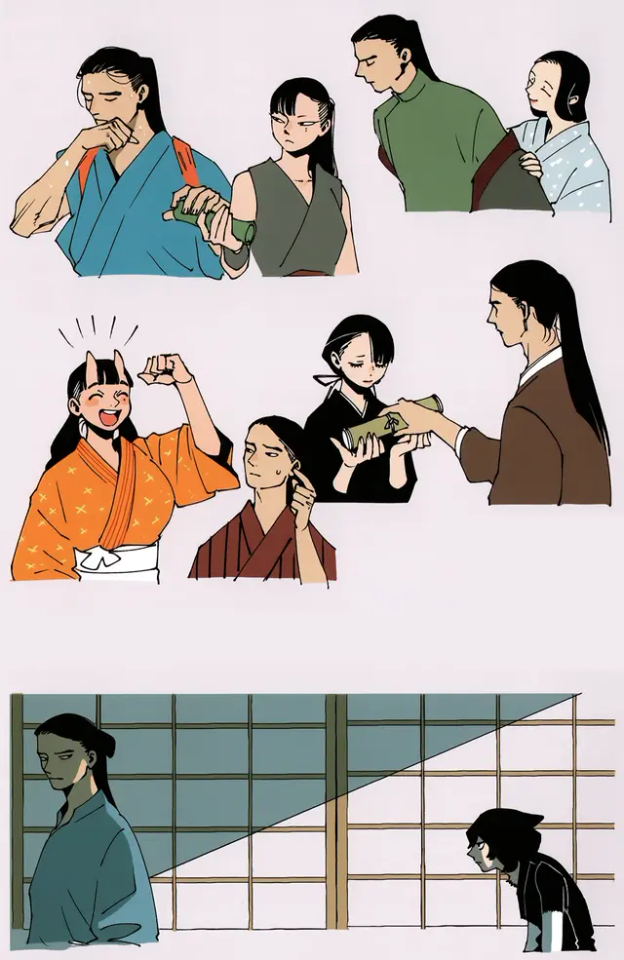
Returning to the narrative's themes of consumption, Toshiro cannot avoid eating just as he cannot avoid perpetuating the exploitative system of his household. The Nakamoto clan consumes the labor and personhood of those lower in the hierarchy. The retainers' labor as spies and domestic servants is the foundation of the clan's existence. Thus, the clan consumes their labor to sustain itself.
Within this hierarchy, the retainers' personhood is also consumed and erased. As Izutsumi describes, they are given different names and stripped of their agency to reject orders or leave. Maizuru and Hien also say their feelings are irrelevant in the context of Toshitsugu's and Toshiro's wants and needs. Both women are expected to comply with whatever is most beneficial and comfortable for the noblemen. Clearly, despite Toshiro's detachment from his household's functions, these social structures remain in place and harm the women under him.

Although we know the Nakamoto clan has male retainers, the choice to highlight the female retainers seems intentional. We're asked to interrogate how not only being a servant or a slave in a noble household impacts a person's life and agency, but how being a woman intersects with being a member of some of the lowest social classes.
Toshiro only distances himself from his father's behaviors of infidelity and exploitation so long as it doesn't take Toshiro out of his comfort zone. He doesn't free his slaves. He's far too comfortable with his female retainers performing domestic labor for him, and he barely acknowledges their efforts; they're shocked when he thanks them for helping him save Falin. He hasn't unpacked his sexist (or classist or racist) biases because he perpetuates his household's oppressive hierarchy throughout the narrative. Considering all of this, he inevitably brings this baggage to his interactions with Falin.

Falin is presumably one of the first women he's had extended contact with that isn't his relative or his family's servant. Because of his trauma surrounding his father and Maizuru sleeping together, he understandably falls for a woman as disconnected as possible from his father and his clan. He seems to genuinely like Falin, respects her boundaries, and graciously accepts her rejection. His behavior towards her is overall kind and unproblematic.
But if Falin had gone with him, she would've likely been devalued and sidelined like the other women of the Nakamoto household. No matter how much he loves Falin, simply loving her cannot replace the difficult work of unlearning his sexism. Love, of course, can and should be accompanied by that work, but by the close of the narrative, we gain little indication that Toshiro acknowledges or seeks to end his part in exploiting and devaluing women and other marginalized people.
A spark of hope does exist. Toshiro expressing his feelings to Laios and Falin suggests that his time away from home has encouraged him to speak up more. Breaking his habit of avoidance may be the first step towards acknowledging his complicity in systems of injustice and moving towards dismantling them.
Special thanks to my very smart friend @atialeague for bringing up Toshitsugu's relationship with Maizuru and the replication of dynamics of consumption and class! <3
#toshiro nakamoto#maizuru#hien#toshitsugu nakamoto#falin touden#izutsumi#inutade#benichidori#shuro#dungeon meshi#dunmeshi meta#dunmeshi analysis#quite literally free my girls#i got so sad after finding that parallel between maizuru and hien both saying their feelings don't matter#reading maizuru's character bio and how she's a brilliant woman#but she's stuck w toshiro's dad like#i'm toshitsugu's number one hater he better watch out#also thinking about how toshiro looked up to maizuru not even his own parents until he found out about maizuru and his dads relationship#that's devastating bro#im entering my clickbait title era LOL i was told my prev titles were too academia pilled and boring sounding#i think i want to write about izutsumi's and inutade's relationships w gender next#delicious in dungeon#dunmeshi#*mine#*meta
882 notes
·
View notes